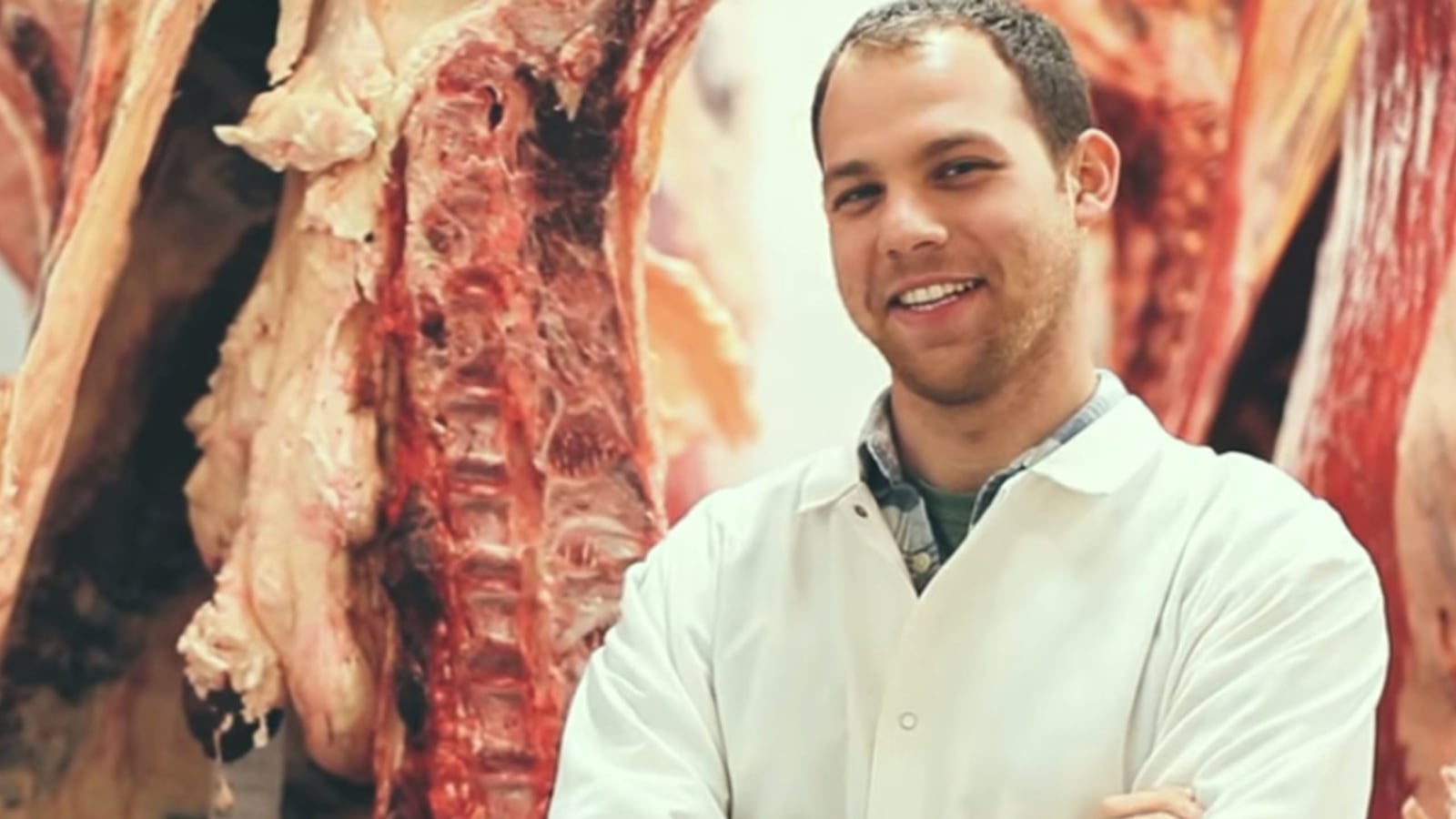When Dan Honig was getting ready to slaughter a steer for the first time, he expected to feel devastated.
He was, after all, mostly vegetarian, eating meat only a few times per year. He’d double-majored in philosophy and environmental ethics, and got a master’s degree in bioethics at New York University. During that time, he’d studied the ethics of meat-eating and animal welfare, and even written his master’s thesis on the subject. “I thought I’d be sniffling, thinking, I don’t want to kill you, I don’t want you to die,” he said. Instead, “I felt no remorse.”
Today, Honig, 25, is still mostly vegetarian. “The American food system is as wrong to animals as if I hit you in the face,” he told me. “It’s a system of mass torture. It’s bad for the animals and it’s bad for us. It’s caused our obesity epidemic and drug-resistant microbes.” Honig, however, is also the co-founder, along with Alex Dimin, of Happy Valley Meat Company, which supplies beef to some of New York City’s most modish restaurants, including Colonie and The Pines in Brooklyn and The Meatball Shop in Manhattan. He sees his business as part of the ethical answer to factory farms.
Honig was always an unlikely butcher. He grew up not on a farm, but in suburban Malapan, New Jersey, where killing a steer is not on the typical teenager’s list of chores. He began his education at Franklin & Marshall, but was academically apathetic. Then he read On the Road by Jack Kerouac. “I hated it,” he said, “but it introduced me to Nietzsche.” Nietzsche, in turn, was Honig’s gateway drug into philosophy. Restless in Franklin & Marshall’s bucolic setting, Honig transferred to NYU both for its urban location and its philosophy department’s reputation as the best in the country.
There he found the urban excitement, the intellectual stimulation, and the moral seriousness of his studies finally lit the academic fire under him, and he decided to pursue graduate work. To get a bioethics master’s degree at NYU, students must complete an internship. Even though his undergraduate studies had led him to be a vegetarian, he decided to intern with a small pork producer. He was curious to see firsthand what an alternative food system looked like. In the interview for the internship, it was when Honig mentioned that he was a vegetarian that the pork producer became interested in hiring him.
This internship entirely changed Honig’s perspective on the very possibility of ethical meat-eating. He visited farms, spoke with farmers, and saw their operations. He was also able to visit a slaughterhouse for the first time. Indeed, Honig visited the same slaughterhouse, Paradise Locker Meats, that Jonathan Safran Foer describes in the first chapter of his book Eating Animals. As Safran Foer describes it, Paradise is one of the ideal, ethical slaughterhouses. However, he argues that even in ideal conditions, killing animals for meat is still soul-draining:
“The pig is then hung up again, and someone...cuts it lengthwise down the middle with a power saw. One expects—or I expected—to see the belly cut open and so on, but to see the face cut in half, the nose split down its middle, and the halves of the head peeled open like a book is shocking. I am also surprised that the person who removes the organs from the split-open pig does so not only by hand, but without gloves—he needs the traction and sensitivity of his bare fingers.
It’s not just because I’m a city boy that I find this repulsive. Mario and his workers admitted to having difficulty with some of the more gory aspects of slaughter, and I heard that sentiment echoed wherever I could have frank conversations with slaughterhouse workers.”
“I had an entirely different vision from Safran Foer,” Honig maintained. “It was the first time I went to a slaughterhouse because I wanted to see it for myself. I didn’t see sadness. I saw a job that was done quickly and respectfully.” Indeed, it was his experience working with smaller farms and meat processors that made Honig believe that there can be ethical way to eat meat. That was when he adopted his current practice of eating meat, albeit only occasionally and only when he knows where the meat came from.
I asked Honig whether he agrees with the most well-known philosopher on animal welfare, Peter Singer. Singer’s 1975 book Animal Liberation helped spur the modern animal welfare movement. Singer is a utilitarian—that is, he believes that an act is ethically wrong if it causes suffering or reduces pleasure, and an act is ethically right if it causes pleasure or reduces suffering. Utilitarians generally don’t think that anyone’s suffering or pleasure should be taken more seriously than anyone else’s. Including animals.
One of the earliest utilitarians, Jeremy Bentham, wrote in 1789, “It may come one day to be recognized, that the number of legs, the villosity of the skin, or the termination of the os sacrum, are reasons equally insufficient for abandoning a sensitive being to the same fate. What else is it that should trace the insuperable line? Is it the faculty of reason, or perhaps, the faculty for discourse?...the question is not, Can they reason? nor, Can they talk? but, Can they suffer?”
Singer argues that eating meat is almost always wrong, due to the immense amount of suffering caused by factory farming. However, because a dead animal neither feels pleasure nor suffers, a utilitarian might believe that animals raised humanely and killed painlessly—and replaced by other animals who would not otherwise have lived—may be ethically eaten.
Honig was quick to disassociate himself from utilitarians. “According to utilitarianism, it’s permissible for animals to feel nothing, for anesthetized pigs to just lay there on the floor. That’s just as wrong as killing—it makes me even sadder.” Instead, he sees his ethical obligations as a matter of duties to those with whom we have relationships. “In order for me to be a good brother, there are certain things I have to do. Same with being a good shepherd or good animal caretaker. We have learned so much about animal preferences, and that should inform what we do.” Besides, he noted, treating animals well is good for business. Stressed animals yield poor quality meat.
Ultimately, what his company provides is an easier way for restaurants to have traceable food. The Happy Valley Meat Company finds small farmers and vets them for quality and animal welfare. They buy whole animals from the farmers, and partner with a meat processor to make the cuts and dry-age the meat.
“It used to be that if restaurants wanted to offer their customers traceability—to be able to tell them about the farm where their meat came from, they’d have to buy a whole or a half-animal directly from farmers,” Honig said. Often, however, restaurants don’t want to use all the meat from a cow. “Now they can order just rib-eyes or T-bones, but the story is still attached. The waiter can still let the customer know where the meat came from.”
Honig wrote his master’s thesis in bioethics on the tension arising from the fact that ethical food is a luxury item, which, as it turns out, is a problem that plagues his own business. “We’re pretty expensive,” he says. “Our customers can demand $50 for an entree.” While he donates 1 percent of his company’s revenue in the form of beef, he thinks the solution to the problem that ethical meat is restricted to the rich will have to come in the form of social innovations. For example, he suggests that instead of heavily subsidizing corn, the government could subsidize more ethical food producers. Or perhaps EBT programs could permit the purchase of ethical items based on a sliding price scale.
Honig believes, fundamentally, that the ethical principles he spent years studying don’t demand that he refrain from eating meat entirely. Rather, they can be applied to the production and eating of meat. “Animals have needs and desires. They are not just machines, but morally similar to us,” he said. “We shouldn’t ignore everything that makes them a living creature.”






